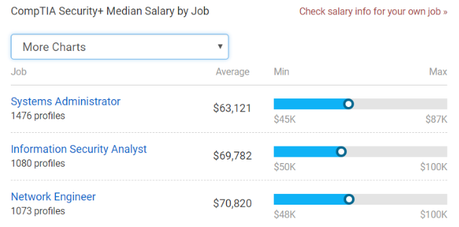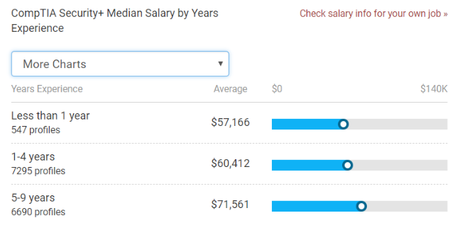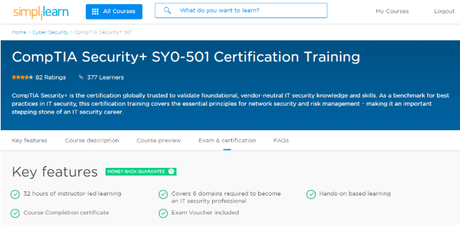If you want a career in IT security, there are certain skills that you need to be competent at your job. As a baseline requirement, employers require their IT security professionals to have CompTIA Security+ Certification. The certificate is globally recognized and will get you an entry-level IT security job in most companies. Taking security+ course will give you the skills you need to troubleshoot, perform administrative and security tasks such as:
- Assessing threats and vulnerabilities
- Identity management
- Compliance
- Information analysis
- Cryptography
We will look at these skills in more detail below.
More so, security+ certification is a stepping stone towards other courses that will prepare you for higher level jobs in cyber security.
What sets CompTIA security+ certification apart
- CompTIA security+ uses hands-on assessments to ensure that security professionals are well prepared to solve a wide variety of cyber security problems that occur in real life.
- Security+ certification is compliant with US DoD 8140/8570.01-M. The certification also meets ISO 17024 standards.
- Certification training focusses on risk detection, management and mitigation trends and techniques that are current.
- It is a relevant test among all IT professionals, including administrators (systems, network, and security) and IT auditors.
5 Reasons to do CompTIA Security+ Certification
Below are some benefits of CompTIA Security+ training:
Your skills will be in demand and you'll get better pay
CompTIA Security+ certification will increase your earning capacity for jobs in both the private and public sector. Payscale estimates that professionals with this certification earn between $45,000 and $100,000, depending on the designation.

Experience also counts; the more experienced you are, the higher you'll earn. The average pay for 1 to 4 years' experience is $60,000 while professionals with more than 5 years of experience earn an average of $71,000 per year.

CompTIA Security+ sets the industry benchmark for handling cybersecurity challenges
As mentioned earlier, CompTIA Security+ certification is globally recognized as the benchmark in security standards. The certification is ANSI/ISO/IEC 17024 accredited, an accreditation that recognizes products for attributes such as: customer satisfaction, quality, competence, and effectiveness.
The certification is vendor-neutral
CompTIA Security+ focusses on cybersecurity in general. It is not limited to select vendors. As such, once you complete your training, you can apply your skills to a broad market. You can also serve in different capacities such as network administrator, information analyst, security consultant, among others.
You can work anywhere, including government agencies
If you want to work as a security consultant for a government agency, Security+ certification will come in handy. The US Department of Defense recognizes CompTIA security+ certification under DOD 8570, as a baseline requirement for Information Assurance Technical (IAT) Level II jobs, and Information Assurance Management (IAM) Level I jobs. Directive 8570 governs training and certification of all persons who have access to DoD systems.
Even though you don't get a job with the DoD, the fact that the DoD considers Security+ as a compliance standard makes the certification that much more valuable in other sectors.
Forces you to stay current
CompTIA Security + Certification has to be renewed every 3 years. This forces professionals to stay current by continuously enhancing skills for tackling cybersecurity issues. CompTIA gives you the option of continuous education through:
- Earning additional certifications, or,
- Taking part in multiple activities such as publishing (books, blogs, white papers, articles), attending conferences workshops and webinars, taking a college course, completing other certifications, racking up years of work experience, and more.
For DoD employees, certified individuals must update their certification status on the DMDC site. These activities will improve your knowledge of current affairs in cybersecurity and sharpen your skills for tackling problems.
The main skills you'll master with CompTIA Security+ training
CompTIA Security+ training will make you proficient at handling:
Network Security
You will learn how to create secure networks and prevent malware attacks or inside threats that will compromise data.
Risk Management
The risk is not only external; it's also internal. For instance, human error or employees with minimal knowledge of systems are some common sources of risk. You will become an expert at identifying and correcting such vulnerabilities before they cause problems.
Threat intelligence
CompTIA Security+ training will prepare you for different types of security threats such as ransomware, zero-days, SQL injections, among others.
Security protocols for mobile
Some companies issue phones and tablets to their employees. This extends security threats outside work-place networks. You will learn how to deploy security controls across all devices so that data is protected whether employees are working onsite or offsite and from any device.
User authentication
You will learn best practices for implementing user authentication measures to keep out anyone who is not authorized to access your network.
Online authentication
Public key infrastructure provides an additional layer of security. It's important for sensitive processes such as internet banking, e-commerce transactions, and exchange of sensitive data. With CompTIA Security+ training, you will learn how to use public key infrastructure to encrypt information.
Your next step: Prepare for your CompTIA Security+ exam
The first thing you need to do to prepare for your CompTIA Security+ certification training by expert instructors drawn from industry.

Anyone can take CompTIA Securtiy+ course. However, having a Network+ certification is recommended but not mandatory. It also helps to have a background in IT administration.
Once you complete your training, you will sit for the CompTIA Security+ exam which includes 90 questions to be answered in 90 minutes. The exam is scored on a scale of 100 to 900. You require a minimum score of 750 to pass and get your certificate.
The different areas tested in the exam are weighted as follows:
- Threats, Attacks and Vulnerabilities (12%)
- Technologies and Tools (22%)
- Architecture and Design (15%)
- Identity and Access Management (16%)
- Risk Management (14%)
- Cryptography and Public Key Infrastructure (PKI) (12%)
As you study and prepare for your exams, keep in mind this weighting as it will help you focus your attention according to subject weight. You should also:
- Use exam simulators as they will offer you an exam-like experience while studying.
- Create a study plan and stick to your study times.
- Stay focused and take notes.
- Engage with people in IT communities.
After you pass, stay active through continuous education and get a job that is relevant to your certification. This will prepare you to retake your CompTIA Security+ certification exam in 3 years.


